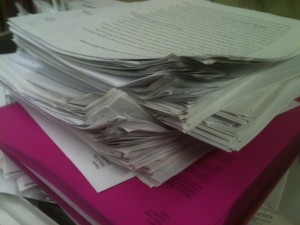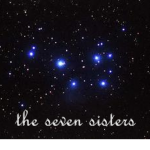Under the ruins of a walled city
Crumbling towers and beams of yellow light
No flags of truce, no cries of pity
The siege guns have been pounding through the night
It took a day to build the city
We walked through its streets in the afternoon
As I returned across the fields I’d known
I recognized the walls that I’d once made
I had to stop in my tracks for fear
Of walking on the mines I’d laid
It’s Old School Friday! You know you remember this song from way back when. It was on autoplay when I was about sixteen, and my friend Molly was the world’s biggest Sting fan. She found him to be So Profound (insert eye roll), thus, she had a Sting song for every occasion. Funny how much our friends’ musical choices shape ours. I know many of the words to many of his songs by heart, even though I wasn’t the superfan. Ah, well. Sting’s largely disappeared from my world, except for a the albums left on Brainradio, one of which is Island of the Blue Turtles where this song, with its imagery of war and hearts, is found.
Anyone who has grown up with challenging parents feels the war thing a bit more keenly than most. If you grew up where voices were raised, objects were thrown or swung with astonishing accuracy – or lack of said – or if you could hear yourself breathe, from holding yourself so quiet and still, and felt like your room, in a closet, was your personal foxhole, you might know how confusing it is to wonder if …the war’s over.
And if I built this fortress around your heart
Encircled you in trenches and barbed wire
Then let me build a bridge
For I cannot fill the chasm
And let me set the battlements on fire
I used to laugh at how on Crash Course, John Green would occasionally address commentary to Me From the Past, the younger, undeniably dumber John Green who was the hapless soul who made non-logical conclusions, dork moves with girls, and in general was a git. My “Me From the Past” has never been quite so clearly identifiable a character, but she exists in my head when I think of my childhood. Especially when I think of my childhood as compared to now. Sometimes – and we all do this – we let Me From the Past be the narrator in our heads that tells Me in the Present how things are going to go down. Occasionally – frequently – my Me From the Past is just as full of dork moves and non-logical conclusions as John’s. She believes that nothing ever changes.
And, sometimes she’s right.
Negotiating a relationship with someone who consistently hurt you, consistently disappointed you, consistently told you that you weren’t good enough, smart enough, or worthy enough is tricky as hell. Now, smart money’s on people like my friend, A., who can just …not do that. She opts to have NO relationship with those family members. But, I … I have, quite frankly, guilt complexes, questions of “am I being a good person” and an inability to let go. Also, I don’t want to hurt anyone. The thought horrifies me.
(This is not, by the way, proof that I’m a good person. This is proof that I have a whisper of Machiavelli in my personality and want to retain the moral high ground at all times.)
Me From the Past stands ready, in the back of my mind, at all times. Me From the Past believes her job is to remind me of things – to supply dates and details, if necessary – so that I don’t make the same dork moves I did back then. That’s okay; I accept that she feels that’s her job. Me in the Present, however, likes to reserve the right to overrule her. And, that’s where the problem lies. How much do you overrule your past? How much do you ignore what you know as truth from situations you’ve already been in?
Then I went off to fight some battle
That I’d invented inside my head
Away so long for years and years
You probably thought or even wished that I was dead
While the armies are all sleeping
Beneath the tattered flag we’d made
I had to stop in my tracks for fear
Of walking on the mines I’d laid
It bothers me to be in my well-past-thirties, and still resentful about parts of my childhood. Our older relatives age; mine are nearing seventy. Some of those problematic people can show themselves to be lovely and affable now; storytellers, bakers of special treats, complimentary and, frankly, changelings that cause me tremendous guilt. Me in the Present wonders who these people are. Me From the Past reminds me that I know this version of these people, too. And that I’ve watched the rebounds happen over and over and over and over and over and over and over again. Me From the Past reminds me, as always, that it is best to feed these people with a long spoon. Me in the Present feels guilty and wishes she could shorten that spoon, get back within arm’s reach. This is troubling to both versions of my self.
Part of maintaining sanity is honoring Me From the Past enough to accept that her experiences are valid enough for Me in the Present to make decisions from. Me From the Past isn’t delusional. Me From the Past is young and goofy, yeah, but she is real and didn’t make overblown statements about what was, simply on a whim. But, sometimes, it’s not about questioning Me From the Past’s judgment entirely, though. Sometimes, it’s just wondering if Me in the Present can ever make the choice that Now is safe. If Me in the Present can ever say to Me From the Past “You can come out now. It’s safe to put your full weight down on your heels, and to not be prepared to run, because the land mines have all been collected.”
This prison has now become your home
A sentence you seem prepared to pay
It took a day to build the city
We walked through its streets in the afternoon
As I returned across the lands I’d known
I recognized the fields where I’d once played
I had to stop in my tracks for fear
Of walking on the mines I’d laidAnd if I built this fortress around your heart
Encircled you in trenches and barbed wire
Then let me build a bridge
For I cannot fill the chasm
And let me set the battlements on fire
The one thing Me From the Past and Me in the Present agrees on is that, so far, not even the UN has managed to collect all the landmines after wars from sixty years ago. Nobody ever collects all the landmines after a war. And, you’ll NEVER KNOW ‘TIL THEY EXPLODE.
Is it discounting Me From the Past’s experiences to want so badly to believe in change? Me in the Present is always afraid of being looked on as a cynic… but sometimes, you are what you are.
I’m pretty sure someone wrote a YA novel about this…




